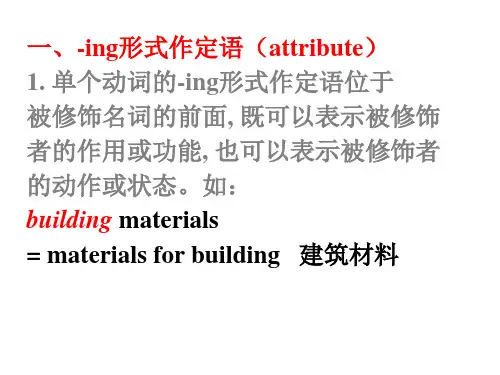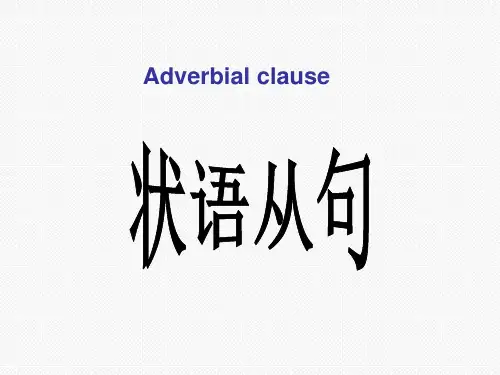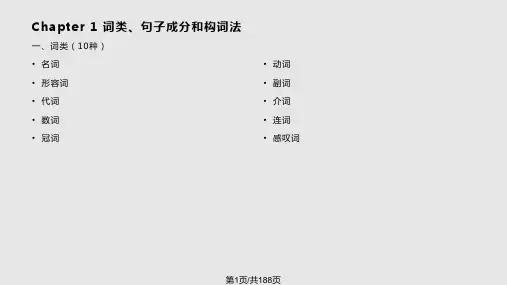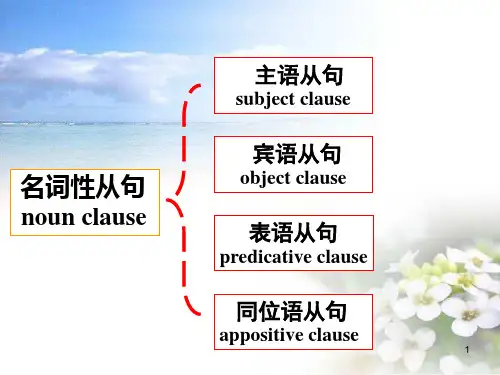- 1、下载文档前请自行甄别文档内容的完整性,平台不提供额外的编辑、内容补充、找答案等附加服务。
- 2、"仅部分预览"的文档,不可在线预览部分如存在完整性等问题,可反馈申请退款(可完整预览的文档不适用该条件!)。
- 3、如文档侵犯您的权益,请联系客服反馈,我们会尽快为您处理(人工客服工作时间:9:00-18:30)。
2.3 Many a + 单数名词,随后的谓语动词用单数;
more than one (语法一致原则),谓语动词用单数.
Eg. Many a student
that mistake before.
A had made
B has been made
C have made
D has made
2.4 数量词(表距离,金额,重量,时间等复数名词),谓语动词 用单数.
1.4 关系分句中的主谓一致问题
1)在“one of + 复数名词 + 关系分句”结构中,分句的谓 语动词常用复数.
Eg. I’m one of those people who are very happy now.
2)如果此结构前有“the”或“the only”等限定词或强调词 时,关系分句的谓语动词形式依one而定,用单数.
语法一致原则: Eg: Many girls want to buy.
Every girl wants to buy.
意义一致原则: 1可单可复 1.1 集合名词:family, crew, people, staff, all, etc.用作整体, 谓语用单数;用作个体,谓语用复数. Eg: My family is poor.
Eg. His brother rather than his parents is to blame.
My husband, ,more than anyone else in the family, is anxious to go there again.
1.6 主语 + as well as /in addition to /with /along with /together with /execpt, 谓语动词形式随主语本身而定.(考 点:通常主语是单数第三人称, 所以谓语用单数)
定语从句(限定性定从&非限定性定从)
1)限定性定语从句中,定语从句和它的先行词所指意义之间 的联系不可分割,若少了它,则不能表达所需的确切含义.
Eg. Success belongs to those students who work hard at ordinary times.
2)非限定性定语从句和它的先行词之间的联系则较松散,只 是对先行词提供一些补充说明.因此,若省去该从句,不至于 影响先行词所指的主要意义.它和主句之间常用逗号分开, 引导词不可用that,常用关系代词which,who,as以及关系副 词when和where引导.
2.6 不定式和动名词做主语,谓语动词用单数.
就近原则
3.1 遇到or, nor, either…or…, neither… nor…, not only… but also…等,谓语动词采用“就近原则”.
Eg. Either my father or my brothers are coming.
Eg. We will put off the sports meet until next week, when the weather may be better.
As has been stated, metals have many good properties.
Eg. Six months is too short a time for me.
Hale Waihona Puke Twenty miles is a long way to cover.
2.5 名词性分句做主语,(what, who, why, how,whether等引 导的), 谓语动词用单数.
Eg. What caused the accident is a complete mestery.
Either my brothers or my father is coming.
3.2 there be 的存在句型中,主谓一致采用“就近原则”
Eg. There are desk.
There is desk.
three apples and one orange on the one orange and three apples on the
高中重点语法讲析
• 英语词类 • 句型转换 • 动词的时态和语态 • 某些动词的固定用法 • 动词不定式和动名词 • 分词(短语)作定语和状语 • 虚拟语气 • 倒装句 • 主谓一致 • 从句讲法一 • 从句讲法二 • 情态动词 • 独立主格结构 • 省略句 • 补充
主谓一致
指导原则: 1. 语法一致原则(主,谓语在单,复数上的一致) 2. 意义一致原则(谓语取决于主语的单,复数意义) 3. 就近原则(谓语决定于最靠近它的词语n.的单,复数形式)
Eg. He is the only one of those boys who is willing to help the little girl.
1.5 主语 + as mush as /rather than /more than /no less than, 谓语动词形式视主语本身单复数而定.(考点:通常该主语是 单数第三人称, 所以谓语用单数)
My family are kindly to others. 1.2 glasses, trousers, shorts(短语),如果之前无单位词而 单独使用,谓语动词用复数;否则用单数.
Eg: My trousers are black.
One pair of scissors is not enough. 1.3 the number of 谓语用单数; a number of谓语用复数.
Eg. The father, as well as his son,is going to travel.
2. 单数
2.1 以-ics结尾的学科名称后,谓语用作单数.
诸如:physics(物理学); mathematics(数学);
mechanics(机械学); politics(政治学)等.
2.2 固定名词the United States, the United Nations 等做主 语,谓语动词用单数.










